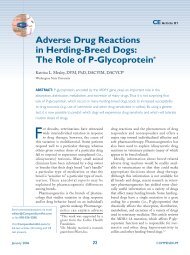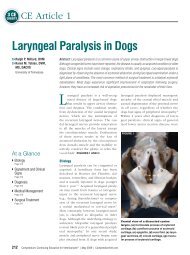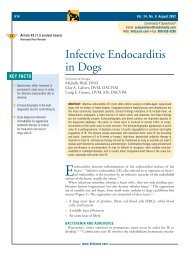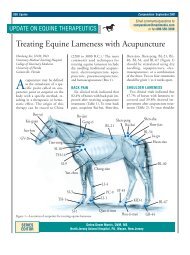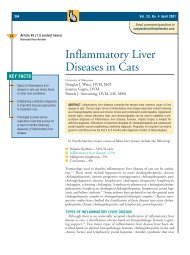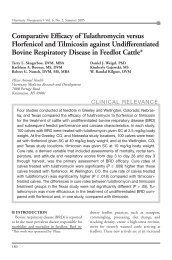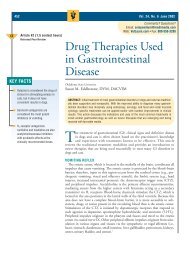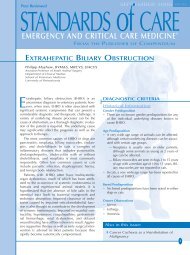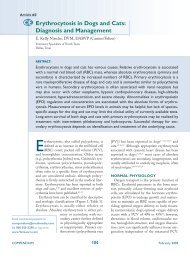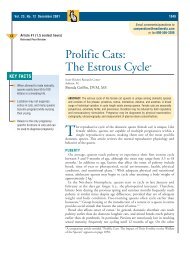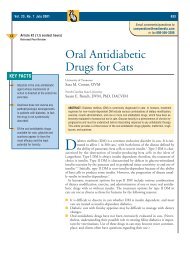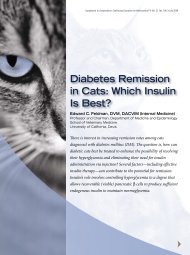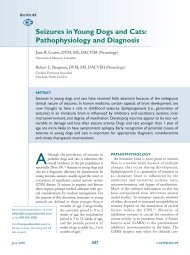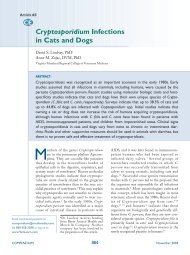Colloid Osmotic Pressure in Health and Disease* - VetLearn.com
Colloid Osmotic Pressure in Health and Disease* - VetLearn.com
Colloid Osmotic Pressure in Health and Disease* - VetLearn.com
Create successful ePaper yourself
Turn your PDF publications into a flip-book with our unique Google optimized e-Paper software.
902 Small Animal/Exotics Compendium October 2001<br />
Box 1. Cl<strong>in</strong>ical Cases<br />
Case 1<br />
A 10-year-old, <strong>in</strong>tact male, 26-kg weimaraner was presented<br />
for acute weakness <strong>and</strong> hematemesis. Initial packed cell volume<br />
(PCV) was 32%, serum total solids (TS) were 4.2 g/dl, <strong>and</strong><br />
<strong>in</strong>itial COP was 16.4 mm Hg (reference range, 17 to 23 mm<br />
Hg). The dog was tachycardic <strong>and</strong> weak <strong>and</strong> had pale mucous<br />
membranes <strong>and</strong> poor pulse quality. Hypovolemic shock was<br />
aggressively treated over 3 hours with 5 L (200 ml/kg) of lactated<br />
R<strong>in</strong>ger’s solution, but severe hematemesis cont<strong>in</strong>ued <strong>and</strong> PCV,<br />
TS, <strong>and</strong> COP cont<strong>in</strong>ued to drop precipitously (PCV, 13%; TS,<br />
2.1 g/dl; COP, 10.3 mm Hg) with no improvement <strong>in</strong><br />
hemodynamic signs. Dur<strong>in</strong>g resuscitation, multiple blood<br />
transfusions (7 units of packed erythrocytes) were adm<strong>in</strong>istered.<br />
The dog became extremely edematous, especially on its limbs<br />
<strong>and</strong> face. At surgery, a large gastric ulcer was identified <strong>and</strong><br />
attributed to NSAID therapy for arthritis. The peripheral edema<br />
began to resolve only after several days of supportive care,<br />
<strong>in</strong>clud<strong>in</strong>g colloid therapy with hetastarch <strong>and</strong> fresh-frozen<br />
plasma. Follow<strong>in</strong>g colloid therapy, COP had <strong>in</strong>creased to 14.6<br />
mm Hg, while TS were 4.3 g/dl.<br />
could potentially be used as a prognostic <strong>in</strong>dicator. Although<br />
some studies have related low COP to an <strong>in</strong>creased<br />
risk of develop<strong>in</strong>g pulmonary edema <strong>in</strong> humans,<br />
no such studies have been conducted <strong>in</strong> veter<strong>in</strong>ary medic<strong>in</strong>e.<br />
6 Measurement of COP can also be used as a guide<br />
for colloid therapy. However, an optimal level of COP<br />
achieved with colloid therapy <strong>in</strong> various cl<strong>in</strong>ical sett<strong>in</strong>gs<br />
has yet to be determ<strong>in</strong>ed. Because COP is so dependent<br />
on plasma album<strong>in</strong> concentrations, the impact of nutri-<br />
Peripheral edema due to low COP.<br />
Case 2<br />
A 5-year-old, neutered, 24-kg Labrador retriever was presented for an 8-week history of small-bowel diarrhea <strong>and</strong><br />
weight loss. The st<strong>and</strong>ard gastro<strong>in</strong>test<strong>in</strong>al workup <strong>in</strong>cluded a <strong>com</strong>plete blood cell count (CBC), biochemical profile,<br />
multiple fecal exam<strong>in</strong>ations, abdom<strong>in</strong>al imag<strong>in</strong>g studies, <strong>and</strong> endoscopy with biopsies. Based on cl<strong>in</strong>ical f<strong>in</strong>d<strong>in</strong>gs <strong>and</strong><br />
histologic characteristics, the dog was diagnosed with severe lymphocytic-plasmacytic <strong>in</strong>flammatory bowel disease.<br />
Despite a low serum album<strong>in</strong> of 1.4 g/dl (reference range, 3.0 to 4.2 g/dl) <strong>and</strong> a low COP of 10.6 mm Hg, no edema<br />
was detected.<br />
Case 3<br />
A 7-year-old, spayed, 31-kg Doberman p<strong>in</strong>cher was presented for lethargy, <strong>in</strong>appetence, <strong>and</strong> edema extend<strong>in</strong>g<br />
from the face to all four limbs. A diagnostic workup was performed, <strong>and</strong> no abnormalities were noted on the CBC,<br />
ur<strong>in</strong>alysis, thoracic radiography, or abdom<strong>in</strong>al ultrasound. On a biochemical profile, the album<strong>in</strong> concentration was 3.0<br />
g/dl (reference range, 3.0 to 4.2 g/dl) but was otherwise unremarkable. Systolic blood pressure (130 mm Hg), CVP (3<br />
cm H 2O), <strong>and</strong> COP (21.8 mm Hg) were with<strong>in</strong> normal limits. Given the normal COP, the edema could not be<br />
expla<strong>in</strong>ed by low oncotic pressure. Titers for ehrlichiosis, leptospirosis, <strong>and</strong> ant<strong>in</strong>uclear antigen were negative. Sk<strong>in</strong><br />
biopsies demonstrated neutrophilic <strong>in</strong>filtration of vascular walls, consistent with vasculitis. S<strong>in</strong>ce no <strong>in</strong>cit<strong>in</strong>g cause was<br />
identified, prednisone (20 mg q12h PO) was <strong>in</strong>itiated. After 2 weeks of therapy, the edema <strong>com</strong>pletely resolved <strong>and</strong> the<br />
dog showed no other signs of illness. Prednisone was gradually discont<strong>in</strong>ued.<br />
tional support, either parenteral or enteral, on overall album<strong>in</strong><br />
synthesis needs to be evaluated. Development of<br />
newer synthetic colloids with decreased side effects <strong>and</strong><br />
<strong>in</strong>creased <strong>in</strong>travascular persistence holds much promise<br />
for the treatment of critically ill patients. As our underst<strong>and</strong><strong>in</strong>g<br />
of COP <strong>in</strong> health <strong>and</strong> disease cont<strong>in</strong>ues to develop,<br />
direct measurements of COP <strong>in</strong> cl<strong>in</strong>ical patients<br />
could be<strong>com</strong>e an <strong>in</strong>dispensable tool <strong>in</strong> the monitor<strong>in</strong>g<br />
<strong>and</strong> treatment of critically ill animals.



